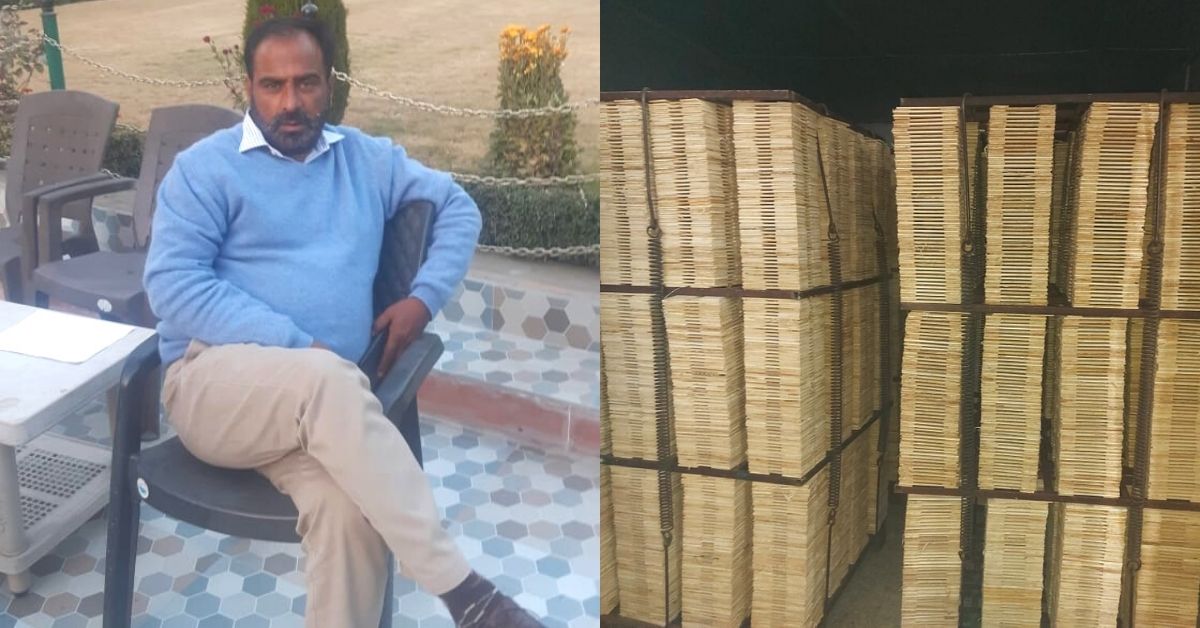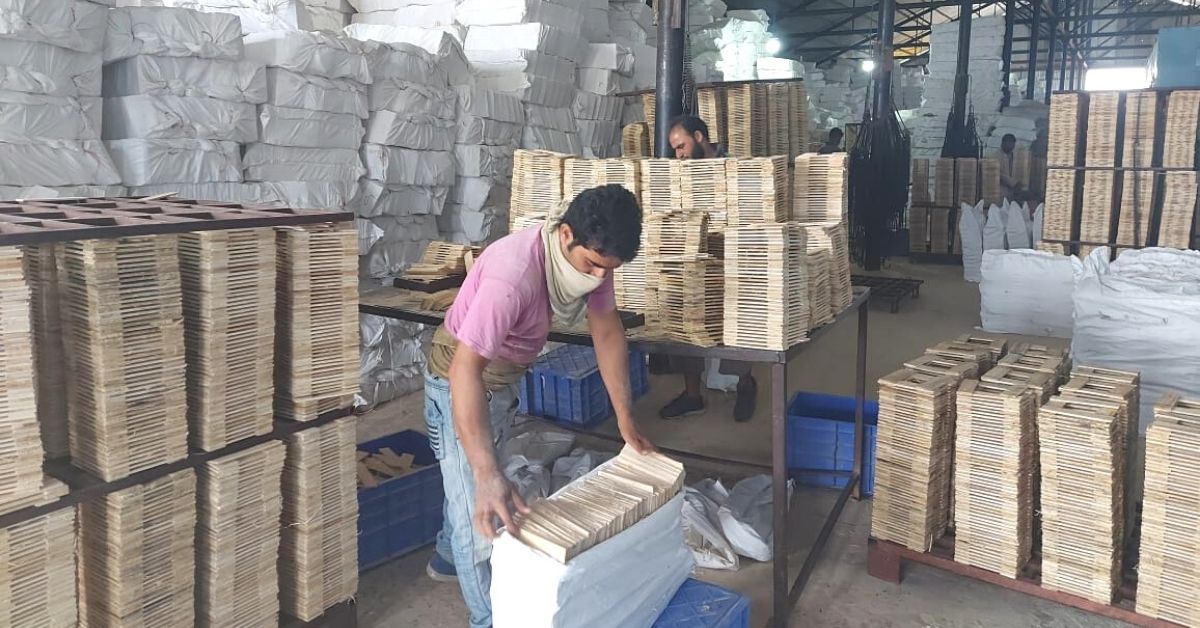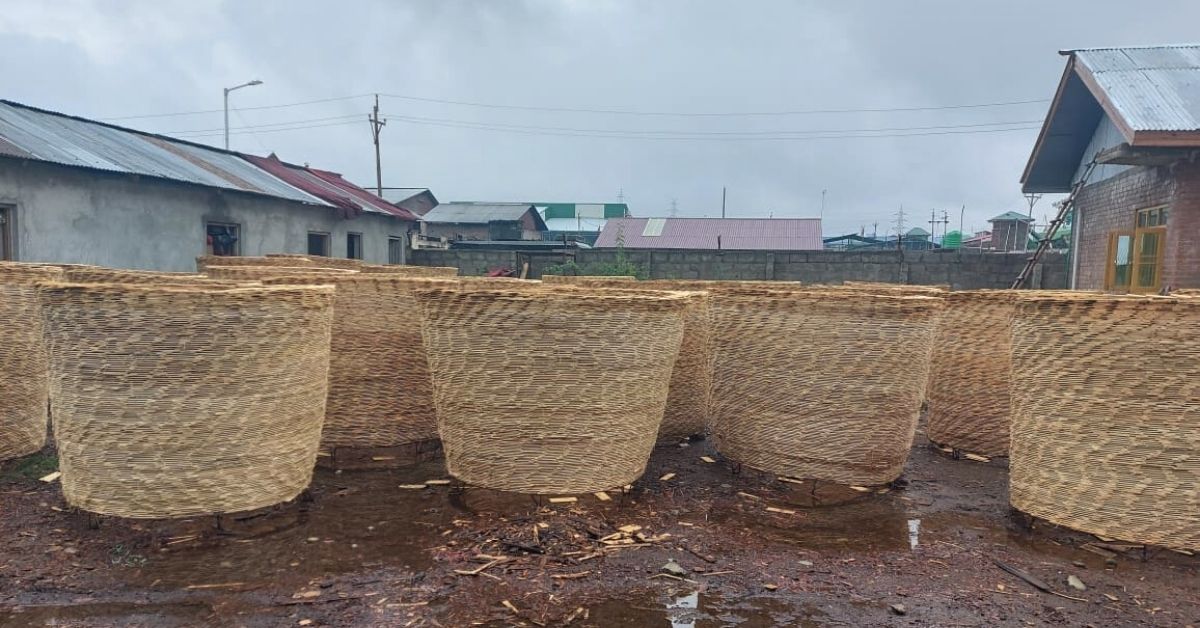India Imported 60% of its Pencil Wood. This Kashmir Village Made Us Self-Reliant
About 4,000 employees in 17 units in Oukhoo village of Pulwama contribute to 90% of pencil manufacturing in India

Do you remember writing with those slender wooden pencils during your initial days of learning? These pencils have a nostalgic ability to transport us back in time to those good old school days.
But little do we know that the raw material for the majority of these pencils come from the modest Oukhoo village in Pulwama district of Kashmir.
The village holding 17 units and the 4,000 employees is scripting a new success story to make India Atmanirbhar (self-reliant).
Popularly termed as the “pencil village of India”, it even got a mention in PM Modi’s recent radio programme, Mann Ki Baat, for it has helped to reduce the dependency for pencil wood from other nations in the past few years.
“India used to import wood and pencil slats from China, Sri Lanka and Germany, but in recent years all these slats are made in India,” says Manzoor Ahmad Allaie, who owns Jhelum Agro Industries.
The wooden slats are supplied to the biggest pencil manufacturers in India like Nataraj, Apsara and Hindustan pencils.
Straight from the poplar trees

The wood for these pencils mainly comes from poplar trees, a peculiarly supple wood which makes it best suited for manufacturing pencils.
The poplar wood grows best in the valleys of Kashmir where the moisture content is ideal, and the weather conditions allow the wood to remain soft during the tree’s growth.
Poplar is grown in flood plains, valley streams and even empty spaces along the roads.
Explaining the history, Manzoor says, “During the 1960s, Deodar forest wood was banned by the government which was initially used as a raw material for pencils. The poplar wood replaced Deodar in 1992-93 as raw material.”
Logs of wood were supplied to the manufacturers in other parts of the country as the players in this industry grew.
It was until 1995 that the logs were cut and sent in bulk quantities. Eventually, by 2010, the wooden logs were processed, broken down to smaller bricks and blocks and sent to the manufacturers.
But it was in 2013 that Manzoor set up the unit for converting these blocks into wooden slats. The slats are made at band-saw mills into 5.2 mm thickness with dimensions of 78x77mm. The small pieces of wood are then sun-dried or placed in a machine that absorbs moisture.
The slats, once ready, are then packed in batches of 800 per bag and sent for further processes.
Preparing slats is about 50% of the process to manufacture pencils.
The slats then go to manufacturers in Jammu, Chandigarh and Gujarat for the remaining process to make the finished product.
A Lucrative Pencil Business

Since then, 17 such units have mushroomed in the Pulwama district.
Experts claim that there is enormous untapped potential, which has enabled the fast growth of the industry in the area. “The monthly turnover of the industry is Rs 3 crore. It is not only the locals but also the government that earns a lot from the taxes. The business becomes lucrative as the wood is also useful for making plywoods and other materials,” he adds.
Manzoor says the uncertainty of weather affects the growth and productivity of apple orchards. “The growing of poplar trees becomes a steady additional income or an alternative due to its high demand,” he adds.
Shaik Nisar Ahmad, president of the Industries Association Lassipora, Pulwama says, “The government needs to recognise the sector as a growing industry and allow subsidies or incentives to promote it. It can further enable multifold growth employing thousands of youth in the area.”
Feroz Ahmad, the owner of Barkat Agro Industries, entered the business in 2014. “I have about 150 employees, but the unit is temporarily shut, due to the ongoing COVID-19 pandemic crisis,” he adds.
Onto Choppy Waters

Feroz tells The Better India that though the prospects look promising for the industry, a lot more is needed to optimally reap benefits.
“There is the interrupted electricity supply in the area that affects the profits. Majority of the manufacturing hours are spent on using diesel generators which add to the manufacturing costs reducing the profit margins,” he adds.
The entrepreneur says other lack of infrastructure support from the government and administrative delays make it difficult to operate the industry. “The COVID-19 pandemic has added to the woes of the unit owners. About Rs 4 crore of the ready stock is piled up in the storages since the lockdown, but it has been difficult to send it to the manufacturers,” he adds.
Another senior member of the industrial organisation requesting anonymity says the monopoly of the pencil manufacturers is also hindering the growth in Pulwama.
“The three major pencil manufacturers control the dynamics of the industry. An individual cannot buy machinery to set up a unit and manufacture the pencil slats. The reason is the massive profits that lie in the industry that prevents anyone from operating without their blessing,” he adds.
Watch: Wooden Pencil Slats Stacked For Drying

The industry member says that over 20,000 locals could get employment if the deadlock between the industry giants and the locals end. “Every house can be a part of this industry and have a sustainable livelihood. Pulwama is also ridden with militant issues, and youngsters can find a good career prospect in the industry if the manufacturers support,” he tells.
The expert says the other battle is fighting with the government. “The government wants to ban the growing of poplar trees claiming it causes infection. The Supreme Court has stayed the decision on the same. But if the mass plantation is allowed, poplar can be a brilliant economic prospect for farmers that will help the environment and also the industry,” he adds.
However, the industrialists are optimistic and claim that in future, the entire process of pencil manufacturing can be made possible from the valleys of Kashmir. “The mention by the Prime Minister in Mann Ki Baat gives us hopes. Once the government starts supporting the industry it can grow to manufacture the pencil from raw materials to a finished product in Pulwama itself,” says Manzoor.
He adds that the cost of raw material is less and if the entire process of manufacturing happens in one place, its cost will reduce further and “India may even be able to export to the world”.
(Edited by Yoshita Rao)

Similar Story

Laundromats in India? Couple Built Rs 100 Crore Biz Washing Dirty Linen Across 100 Cities
Faridabad’s Arunabh Sinha and his wife Gunjan Taneja launched UClean in 2017 to set up an organised laundromat service in India. Currently, they are spread across 100+ cities and have 350+ outlets across the country.
Read more >
If you found our stories insightful, informative, or even just enjoyable, we invite you to consider making a voluntary payment to support the work we do at The Better India. Your contribution helps us continue producing quality content that educates, inspires, and drives positive change.
Choose one of the payment options below for your contribution-
By paying for the stories you value, you directly contribute to sustaining our efforts focused on making a difference in the world. Together, let's ensure that impactful stories continue to be told and shared, enriching lives and communities alike.
Thank you for your support. Here are some frequently asked questions you might find helpful to know why you are contributing?


This story made me
-
97
-
121
-
89
-
167












